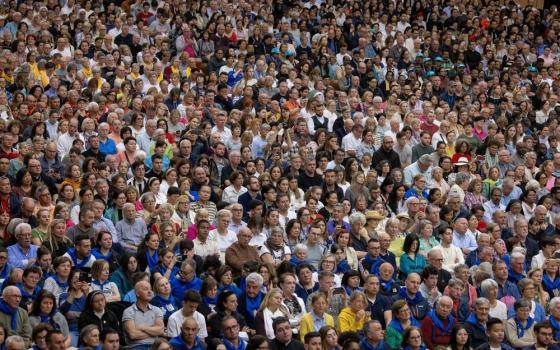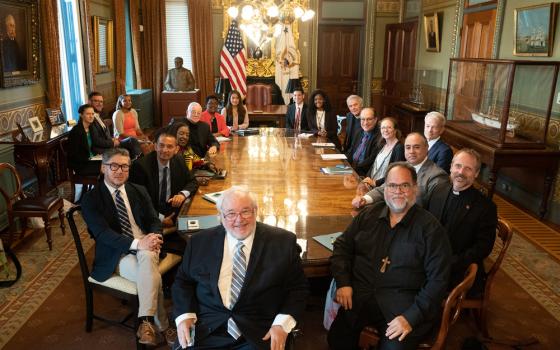
Women: Birthing justice, birthing hope. Part 6 of 12
A 61-year-old Tupi-Guaraní indigenous farmer, Ilda Martins de Souza has been part of the movement for social and economic justice since she was 18. Here she recounts the challenges and satisfactions of her work for a more just Brazil and a more just world.
By Ilda Martins de Souza
Itapeva, Brazil -- My parents lost their plot of rural land in the '60s; the landowner expelled them. After that, we didn’t have anywhere to live. I was young, and I went to São Paulo to try to make money to buy land for my father. I never could, since it was difficult to work and make enough money to buy land.
But while I was in São Paulo, since I had been raised in the Catholic Church and religion was very strong and present in my life, I started organizing through going to church. I made a lot of friends there and realized we had similar problems. First, because a lot of us lived in São Paulo and rent was too expensive, we started organizing among ourselves for affordable rent. Then we started to fight to lower utility prices and better our living conditions. I got involved with the struggle at a very early age – I was eighteen – and I really liked it.
The struggle was very beautiful. I first became an activist in the progressive church and the Workers Party; my children were activists, too. Then I got involved in the movement for housing in São Paulo, for the homeless and those living in the favelas, the slums. It was really gratifying. Each family you kept off the streets was a great joy.
It was difficult, because this was during the time of the dictatorship and we couldn’t have meetings. We talked with families in soup kitchens in churches. We spread a consciousness of what was taking place in the country so that people would liberate themselves.
And we suffered mistreatment because of this. I was kicked out onto the streets from different houses I rented. Then we would occupy an abandoned house and when we began to organize again, they kicked us out again. But we didn’t let this bring us down, we never lost our hope. We had hope that many good things were ahead of us, you know?
My kids were young, and I worked at night too as a metalworker to earn money and feed them. I would leave my kids asleep while I went to the factory. This was a very important part of growth in my life. It was marvelous. The movement began to form me, to educate me to discover my real values: values as a human being, as a woman, as a mother. Because a mother enters the fire to liberate her children. And I managed to educate my children as activists.
Through this experience, we were able to discover the beautiful Movement of Landless Rural Workers [MST by its Portuguese acronym]. We had heard people talking about it, but when it was born in São Paulo, I had the great task of organizing to collect food and clothes and coats and medicine that we would take to the countryside. And through those collections, I met the MST activists and leadership. It was still very small at the time, but it was turning into an ants’ nest.
And so I began to integrate myself into the movement, and I met my dream of returning to the countryside. In 1988 I left São Paulo and came here to Itapeva to do work with the grassroots. In 1989, I was part of an encampment [a squatter’s settlement demanding land redistribution] with my children, which was a rich experience.
My husband and I were not very compatible because he didn’t like the struggle and I did. Also, he couldn’t accept my work because he dominated everything. So that we didn’t keep arguing, after 18 years of marriage we separated. I kept my five children and adopted a sixth, a little one whose mother had died. And I stayed in the struggle.
With every new day, you struggle for a better tomorrow, for health, for education. For an education better than the one you had, better than the one children have today.
One thing that women don’t realize is our strength as women. Mothers are the stars that will guide their children. When a mother gains her consciousness, she creates a rainbow because she works and struggles with all of her heart to guarantee that her children and her children’s friends accompany her. And with that, the family is able to mobilize the people to struggle for a better life.
I am so proud to be a woman and to see women struggling, because I know that therein lies the future. If I was to be born ten times, and I had a say so, I would want to be born a woman. I wouldn’t want to change that, because it’s the most marvelous thing this life has to offer: a woman’s consciousness. When she recognizes her consciousness, she goes very far. She’s creative, she doesn’t lose the beauty of being a woman no matter where she happens to be. That is one of the things each of us should be most proud of…to set our feet on the ground and declare: I am a woman.
I am a transformed woman. There are not enough riches or money in this world to make me change my ideology.
Still, I have a lot to learn, because our life is a book. Every moment brings along with it a new lesson. It’s an open book and you’re learning day by day.
Given all of the riches our country has, it is so sad to watch our kids go hungry. My dream is to see real agrarian reform for all the land, so that no child goes hungry and no mother sheds tears because her son was murdered trying to steal a piece of bread.
Those who occupy land do so out of necessity because they have no other way out. They no longer want to live in misery, or under bridges. We came here to survive, to work, to not die of hunger in the city. To not see our children dying.
This beautiful thing that comes from the conquest of a piece of land: it’s a revolution. A revolution takes place once people set up an encampment [a squatters’ camp on land they hope the state will turn over to them], and when it became a settlement [a land reform community on land won by the landless], and when we take the land from one hand and put it in the hands of a thousand. The land becomes a communal good for everyone and that is revolution. Landowners would only use this land for cattle, and now we produce beans, milk, food for the entire population.
Without firing a gun, we created a revolution. Without a death toll we made revolution. Without shedding blood… it’s unnecessary.
This alternative is based on the dreams of everyone who comes to the countryside to be part of the land reform movement. We begin to discover these dreams and allow people to journey in them. “How is it that I want my life to be in the countryside? How do I want to live?” We learn that people want a small house, they want their children educated, they want to plant a variety of products to eat, to have a pretty table, to have milk for their children that is never scarce. And to see their kids study and play. That’s what we discover slowly, traveling through the minds and dreams of each human being that becomes part of our settlements. We don’t impose anything on them. You discover that you can share your dream with someone else, unite it with theirs, and begin to construct paradise together.
And so it is possible to change. We begin to arm ourselves, we learn, we become educated, and we learn how to say no. When we need to, we say no. This is a serious problem for many governments.
Every child is my child. I am not mother to five or six. I am mother to thousands of youth, of children who were born in settlements or came to settlements. The pain of a mother is my pain. I cannot just listen to a mother in pain because her son was murdered in the favelas, the slums. And that’s why we struggle and fight in the countryside, so that our children won’t go through that.
We want to build this paradise for our children. So they can step on this land and be proud to say, “Here on this land, we do not shed blood. Here we don’t wage war.” This is what people want. A better world for our children, for our people.
With the MST, I train youth, women, families in producing food. We still use machines, but we do it all without toxics. Forest preservation and water preservation are critical, too. Our battle today is to produce our own seeds and no longer depend on multinational companies. To produce our own milk without using all those chemicals and hormones. Our food must be quality food. We want to return to our own womb of production.
I also work the land with my children. My kids all live together and they all work. My house is next door to my kids. We’re part of a cooperative. We produce grains and milk. We exchange products within the settlement itself. No, we don’t need money. We do solidarity exchanges.
I still have much to contribute to the MST, you know? All that I’ve gained throughout the years the movement has given me, and the chance to raise all my kids here in this piece of land, in this paradise: that’s my pride and joy. And today what I have to do is, contribute to the MST to help construct other paradises for other families.
| About the "Women: Birthing justice, birthing hope" series
Among income inequality, seemingly endless wars, and debilitating climate change, it is difficult for many to imagine a path to a better way. In fact, throughout the industrialized North and the global South, solutions to these great challenges are in various stages of construction -- and much of the lifting is being done by women. Grass-roots women’s movements -- progressing often almost without money or access or institutional power -- are emerging and offering alternative and empowering visions. The above is part of a series, titled "Women: Birthing justice, birthing hope," which will appear in NCR by writer and organizer Beverly Bell, coordinator of Other Worlds. She features empowered women who offer alternative visions as they birth a new and more just world order. Seven of the articles in this series are available in a 2010 Lenten booklet, Cry Justice! Cry Hope! with additional reflections by Sister Joan Chittister. Click here to order. All the stories from the "Women: Birthing justice, birthing hope" series
|





